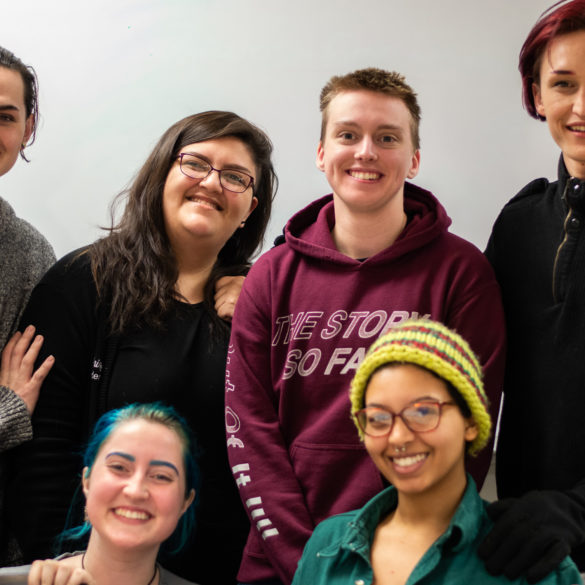Spectrum provides a close family environment and supports the LGBTQ community at Ball State.
Walking through the Spectrum office at Ball State University, Eli Lucas smiles at the people who greet him.
Your beard hair is really coming in, Eli!
Mr. Lucas, sir.
The comments from Eli’s friends in Spectrum, one of Ball State’s LGBTQ organizations, and from others around campus help him feel more confident in his body. Eli, an 18-year-old transgender student, has found his family.
Leslie Becker-Phelps, author of Insecure in Love and a psychologist who is dedicated to helping people understand themselves, would call this kind of group an emotional family. She uses this term to describe people either inside or outside your biological family who support you in difficult times and celebrate you in good times.
“You want the people in your family to be a safe haven,” she says. Emotional families encourage the exploration of interests, values, and the world. Spectrum has provided that safe place for Eli to accept himself as he continues his transition.
Every day at 5 p.m., Eli takes a photograph of himself so he can see how much he’s changed by the end of the year. Testosterone therapy has done a lot for Eli physically, deepening his voice and sharpening his physical features.

And Spectrum has given him a place to belong. He describes the organization as a close and welcoming family, full of people who are all facing similar issues. It’s a community where LGBTQ students can feel comfortable talking about their personal difficulties.
After coming out as a transgender man during high school, Eli felt rejection from friends and teachers. His family was frustrated and confused. But today, he can surround himself with the rainbow colors of the Spectrum office and the laughter of his friends.
Becker-Phelps says emotional families like this have to be built on open communication and shared experiences. Sometimes, that shared experience includes a lack of sufficient support from biological or legal family members, leading individuals to seek what they need from other people.
According to the 2015 U.S. Transgender Survey, 18 percent of respondents felt that their families were not supportive of their transgender identities. The study also listed behaviors considered supportive, such as respecting a transgender person’s decisions, using their preferred name and correct pronouns, standing up for them, and doing research to learn how to best support the person.
Four years ago, Eli thought he was lesbian. He was attracted to girls and didn’t feel he fit the norm of femininity. He tried makeup and dressing in “girly” clothes, but none of it felt right.
Plus, he didn’t have a solid definition of what it meant to be transgender. Eli thought a transgender person was a drag queen. But about two years ago, Eli found a YouTube video of a transgender man named Alex Bertie talking about his experience.
“I was worried for a while because I related to that so much,” Eli says.
The story opened his eyes, and he realized he was transgender.
In February 2016, Eli unboxed his first chest binder during a FaceTime session with his high school best friend. His friend didn’t know what was going on or how much the moment would influence Eli’s life, but she watched his excitement grow.
Designed for transgender people, the kind of chest binder Eli bought helps create the appearance of a flat chest. Pulling it over his head, Eli looked in the mirror. For the first time, he felt like he saw himself looking back.
After first putting on the chest binder, Eli began coming out to some of his close friends. But his high school in Carmel, Indiana, would be the first battleground. Some friends stopped talking to him, and some teachers refused to call him by his chosen name.
His secret was thrown to the wind as friends turned their backs on him, and other classmates whispered about him behind his back. He says most of the backlash wasn’t directed toward him explicitly, but transphobic comments made their way through the grapevine, and he found out from the friends who did stick with him through the transition. Eli is grateful for those friends. He recalls one moment with his best friend in high school, Lindsey.
What names do I look like? Eli asked her, while trying to choose his new name.
Names… Lindsey hummed, staring at him. She paused a moment, then smiled and said, Eli.
Eli, he repeated. It felt right.
Lindsey and Eli are still very close friends today.
But school was just round one.
Eli’s parents already knew he was questioning his sexuality because he had come out to them as lesbian. But the topic was “swept under the rug,” as Eli describes it. It was rarely discussed in the conservative household. When he realized he was transgender, he’d decided not to tell them.
Then, one day three months after Eli purchased his chest binder, Eli’s mother was upset about him getting in trouble for something at school. When he wasn’t around, she began shuffling through his homework, checking notebooks, papers, and grades in her frustration. That’s when she noticed the name on the papers didn’t match Eli’s legal name.
Who is this? she asked him that night, showing Eli the papers.
This was it.
I’m just trying out the name, Eli replied. Only on assignments, though.
What do you mean?
He explained that he didn’t feel like he was living his life. He was now Eli, and that’s what he wanted to be called. He told them about the chest binder, too.
His dad didn’t yell, but he was confused. He wasn’t quite sure what transgender meant. Eli’s mom was most hurt that Eli’s legal name, a family name, was not on his papers.
For months, his family didn’t talk about it. And that didn’t change until one day when Eli went to his parents about it again, asking them to respect him. He no longer wanted to lead a double life between home and the rest of the world. Eli wanted to be one person: himself.
Eli’s parents faced concerns that parents to LGBTQ children typically face: an uncertainty of how to react. According to research by Caitlyn Ryan, director of the Family Acceptance Project, parents who don’t want to encourage their child’s gay or transgender identity might fear their child will be rejected or hurt by others. This causes fear in the parent, and their reactions can influence the child in unintentionally negative ways.
Eli was 17 years old when he decided he wanted to begin testosterone therapy, which meant he would require parental consent for the prescription to be administered. Testosterone hormone therapy alters the physical body, redistributing weight, thickening the vocal cords, increasing hair growth, and making facial features sharper.
Eli pushed for his mother to make the appointment, but she refused. His parents worried about issues with his dad’s insurance company. They were also worried about Eli’s ability to pay for the testosterone, or that he would backpedal and regret starting the physical transition. He repeatedly told his parents he needed the treatment, and that he really needed their support. Still, they did not agree to make an appointment.
So, Eli took matters into his own hands, masquerading as his mother to call the endocrinologist and make an appointment. With Eli’s persistence and the appointment date set, his mother was in a difficult spot. With reluctance and set conditions that they were only going to check his average hormone levels, Eli’s mother agreed to take him to the appointment.
At that initial doctor’s visit, they found out that Eli had a much higher level of testosterone than the average biological female would have. These tests are normal because it’s important for doctors to check if there are any physical traits that could be affected by the hormone replacement therapy.
The doctor was ready to prescribe testosterone, and once again, Eli was faced with persuading his mother.
They’re ready to write the prescription. All you have to do is say okay!
Not until you’re 18.
That day, Eli and his mother drove home with no prescription. But after much deliberation, she agreed, and they returned to the doctor a little over a week later to get the prescription. However, his mother requires him to pay for it himself and has repeatedly told him, If this goes wrong, you can’t be mad at me. I didn’t want you to do this now anyway.
Eli first encountered Spectrum during college orientation last summer. The members introduced their cause and the allyship that forged a bond among them—a bond Eli would soon be part of as he found his emotional family. Initially hesitant to attend a meeting, it was weeks before he worked up the courage to go. Once he did, he sat in meetings, listening to other people but saying little. It was an open mic night that brought Eli out of his shell.
The audience clustered into a room in the Teacher’s College with the anticipation of getting on stage. On open mic nights, anyone can tell their stories and jokes, anything they might not usually share with others. Eli stood in front of the audience and performed stand-up comedy, his smile growing bigger and bigger when everyone laughed at his jokes. That night ushered in Eli’s continued attendance to Spectrum meetings and events.
Now, Eli is part of the executive committee for Spectrum, acting as treasurer. Their main event this semester will be a drag show, where members will perform to raise money for the National Center for Transgender Equality. The drag show in the fall raised approximately $1,500 for Muncie OUTreach, helping provide resources for LGBTQ youth in the community.
Eli has now been on testosterone for 10 months. He pays for it, and he is pleased with the results. He has lost his smooth chin for more chiseled features. Eli feels more comfortable being with his family now, especially his younger sisters, who support him wholeheartedly. Typically, his transition isn’t mentioned at home unless he notes how deep his voice has gotten or the hairs that have sprouted on his chin. His mother jokes around, acting like she will tug them out, but he knows it’s all in good fun.




